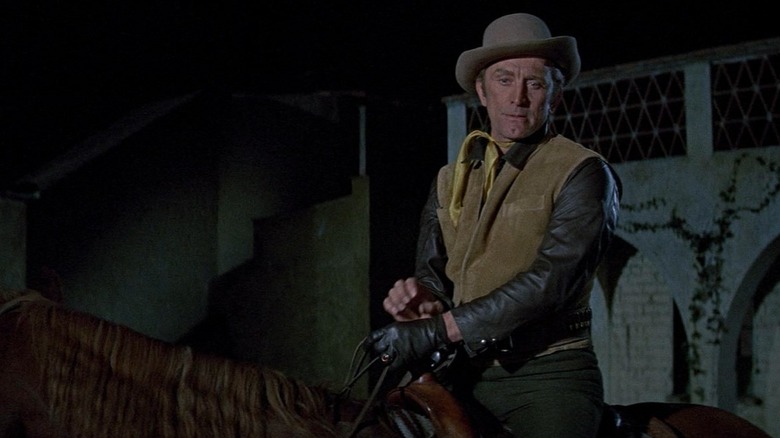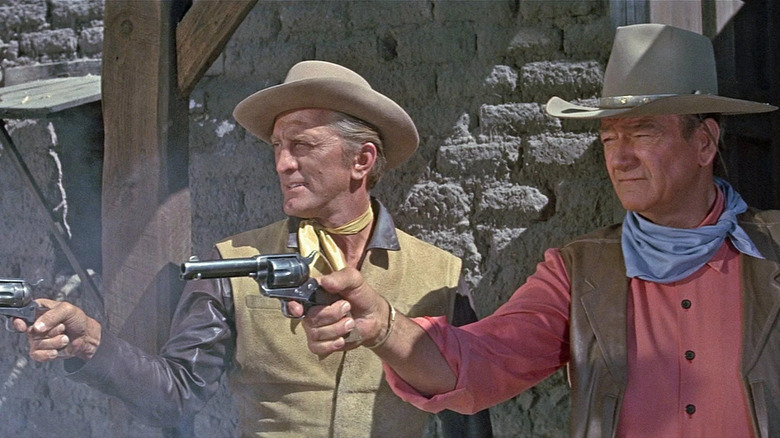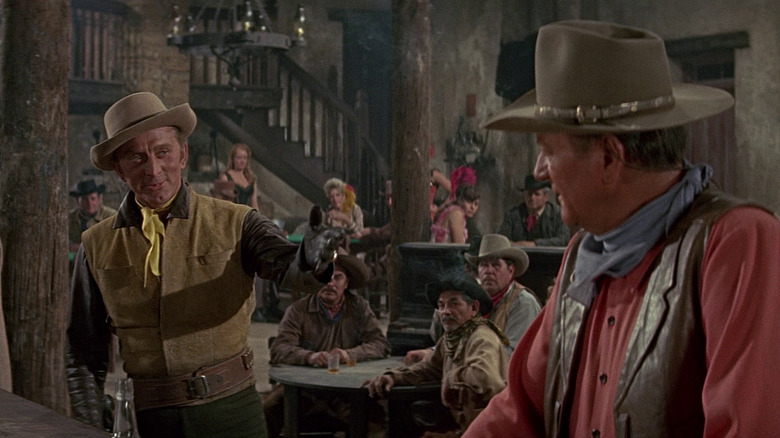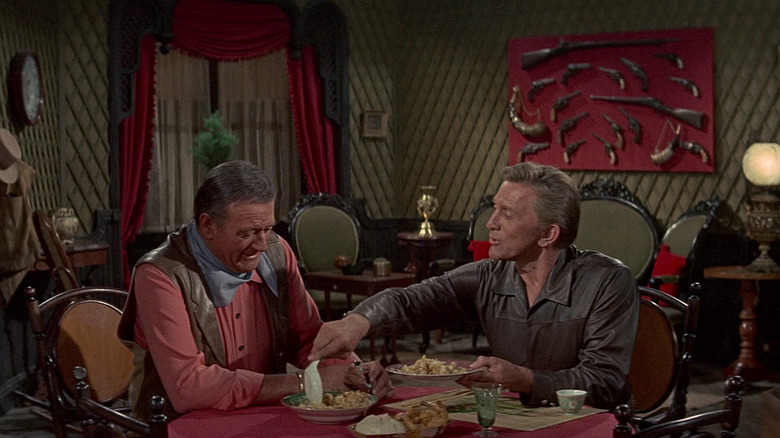Kirk Douglas Never Had The Intention Of Becoming A Movie Star
There is a difference between a famous actor and a "movie star." Actors study their craft, hone their skills in imitating human emotions, and endeavor to inhabit their roles as effectively and convincingly as possible. Movie stars — while they may be good actors — are noted more for an attractive, dazzling "it" quality. Acting is about the art. Being a movie star is about personality. A great actor may languish on the second tier (like, say, Ben Foster), while a bad actor may become the most recognizable, bankable performer on the planet (like, say, Arnold Schwarzenegger).
This dichotomy has brought a great deal of frustration to certain celebrities. When approached by journalists, a celebrity may find themselves having to answer questions about a world they are not privy to. An actor doesn't necessarily know what levels of pop awareness the journalist is carrying when entering the room. They are not involved in deep-cut fandom or online conversations about the nature of their character. They are only actors.
This is a frustration certainly felt by Kirk Douglas — both a movie star and a great actor — who was interviewed by Roger Ebert back in 1969. In the interview, Douglas lamented that some of his more recent projects — at the time, Burt Kennedy's "The War Wagon" and David Rich's "A Lovely Way to Die" — weren't entirely successful, and how some critical writing about said picture made him bristle. In particular, Douglas had an issue with Pauline Kael's review of "War Wagon," as the critic seemed too focused on the state of modern movie stardom than on the picture itself. Douglas had some harsh words for Kael.
You're a bright dame, but you're full of ****
Pauline Kael, for the uninitiated, was one of the more striking voices in film criticism from the 1960s until her death in 2001. She had impeccable, but sometimes unpredictable taste, and was always witty and clear in what she found objectionable about a movie. It was Kael who famously derided "Star Wars" as "like getting a box of Cracker Jack which is all prizes." On the website Chron, Kael's review of "The War Wagon" is quoted in part. She wrote:
"What makes it a 'Western' is no longer the wide open spaces, but the presence of men like John Wayne, James Stewart, Henry Fonda, Robert Mitchum, Kirk Douglas, and Burt Lancaster, grinning with their big new choppers, sucking their guts up into their chests, and hauling themselves onto horses. They are the heroes of a new Western mythology: stars who have aged in the business, who have survived and who go on dragging their world-famous, expensive carcasses through the same old motions."
Douglas, in talking to Ebert, agreed that "The War Wagon" wasn't a cinematic classic by any stretch. But it was, in Douglas' words, a sight better than "A Lovely Way to Die." In calling it "enterainment," he is clearly describing something unsophisticated, but ostensibly satisfying. Reading Kael's perspective angered Douglas, and he turned to an empty chair, representing Kael, to dole out a hard insult, saying:
"And 'The War Wagon.' Well, 'War Wagon' wasn't bad. It was entertainment. I rather enjoyed it. But that woman, Pauline Kael — did you see that piece she wrote about it, about 'War Wagon?' If Pauline Kael were sitting here right now, I'd tell her, you're a bright dame, but you're full of ****."
Kael's idea of a movie star
Douglas continued to rail, addressing the empty chair where Kael was meant to sit. Douglas, seemingly fed up, wanted to point out that what she calls a movie star, he calls an actor who gets a lot of work. Douglas seemed unconcerned with how his fame was perceived when he was up on the screen. A human being, he argues, is a separate entity from the mythic "star" so often talked about in reviews. An actor, Douglas argues, doesn't care about their status in the firmament. He said:
"Don't crucify me because of what your idea of a movie star is. I didn't start out to be a movie star. I started out to be an actor. You people out in the East have no idea what goes on out here. No awareness or knowledge whatsoever. You lose track of the human being behind the image of the movie star."
Douglas then turned back to Ebert to bemoan the state of modern film journalism. Douglas seems to feel that too many writers skew in the direction of celebrity culture and gossip. He certainly doesn't seem to think highly of the profession, and how condescending assumptions are all too common. Douglas, it should be noted, eventually became the author of eleven books, including six memoirs (with one specifically about his Jewish faith), four novels, and a kids' book about Bible figures. Kael, meanwhile, authored 14.
"You know sometimes an interviewer will look at me and say 'You're bright!' They're actually surprised I might be bright. Well, I say, what if I wanted to be a writer? I just might be better at it than you are! Ever think of that? There are a lot of journalists who are just plain dumb."
Modern film journalism
Douglas continued with similar sentiments, reiterating an ages-old conflict between interviewers and their subjects. It's common that an interviewer will ask their subject a question based on a popular perception of that person. People are more nuanced.
Kael's statements, of course, are about a vast cinematic tapestry that involves the work itself, but also how casting and status come to play into the construction of genre. Kael was concerned that movie stardom was overtaking storytelling and overshadowing a collection of already-effective imagery that defines Westerns. Douglas wasn't so concerned with analyzing his level of fame and how it may bleed into whatever he touches. He seemed to feel that journalists ought to focus on the plain truth in front of them, either in criticism or in interviews. Douglas said:
"And I understand what's going on here, for example. The subtleties of the situation. An interviewer is not simply reporting what somebody said. It's a point of view toward that person. It incorporates the point of view of the interviewer ... I don't need a critic to tell me I'm an actor. I make my own way. Nobody's my boss. Nobody's ever been my boss."
Pauline Kael died in 2001 at the age of 82. Douglas died in 2020 at the age of 103. The two, while perhaps at odds in 1967, were both legends in their own rights. Although there is nothing further on record between Kael and Douglas, one can hope that they, under copacetic circumstances, eventually reconciled.



